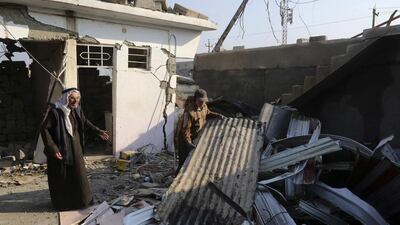MOSUL // Iraqi forces retook the last area of Mosul east of the Tigris River on Tuesday, 100 days into an offensive whose next phase aid groups warned could have dire consequences for civilians.
Army units flushed out fighters of ISIL from a rural area on the northern edge of Mosul, completing an important step in Iraq’s largest military operation in years.
“The Iraqi flag was raised and the left side [east bank] was thus fully liberated,” the Joint Operations Command coordinating the fight against ISIL said.
Commanders from the elite Counter-Terrorism Service that has done most of the fighting and Prime Minister Haider Al Abadi had already declared east Mosul “liberated” last week.
The three months it took to reconquer Mosul’s east saw some tough fighting, but even deadlier battles are expected on its west bank, home to the narrow streets of the Old City and some of ISIL’s traditional redoubts.
That has sparked deep concern among the aid community over the fate of the estimated 750,000 civilians still believed to be living in western Mosul.
“We hope that everything is done to protect the hundreds of thousands of people who are across the river in the west,” the United Nations’ humanitarian coordinator for Iraq, Lise Grande, said.
“We know that they are at extreme risk and we fear for their lives.”
Tens of thousands of security forces now surround the extremists in west Mosul, who are all but trapped in the city.
Residents of west Mosul and civil activists said on Monday that ISIL had forced civilians along the riverfront to leave their shops and houses.
“The group forced us to leave our homes ... without allowing us to take our belongings,” a resident of Al Maidan said. “It deployed gun positions and posted snipers on roofs and at windows.”
Facing them across the river are some of Iraq’s most seasoned elite forces, whose engineers some reports said were already working on pontoon bridges for a cross-river assault.
All bridges across the Tigris in Mosul were either bombed by ISIL or hit by air strikes carried out by the US-led coalition that has helped Iraq reclaim about two-thirds of the territory it lost to ISIL in 2014.
The coalition has meanwhile sought to prevent IS from moving on the Tigris, destroying more than 100 boats in the area over six days, the coalition said.
The UN had feared an exodus of unprecedented proportions before the Mosul offensive began on October 17, but while 180,000 people did flee their homes, most stayed.
“We don’t know what will happen in western Mosul but we cannot rule out the possibility of siege-like conditions or a mass exodus,” Ms Grande said.
“To date, nearly half of all the casualties from Mosul are civilians. It’s terrifying to think of the risks families are facing.”
* Agence France-Presse

